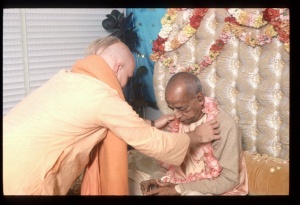CC Madhya 22.26: Difference between revisions
m (1 revision(s)) |
(Vanibot #0054 edit - transform synonyms into clickable links, which search similar occurrences) |
||
| (One intermediate revision by one other user not shown) | |||
| Line 1: | Line 1: | ||
{{ | [[Category:Sri Caitanya-caritamrta - Madhya-lila Chapter 22|C026]] | ||
<div style="float:left">'''[[Sri Caitanya-caritamrta|Śrī Caitanya-caritāmṛta]] - [[CC Madhya|Madhya-līlā]] - [[CC Madhya 22|Chapter 22: The Process of Devotional Service]]'''</div> | |||
<div style="float:right">[[File:Go-previous.png|link=CC Madhya 22.25|Madhya-līlā 22.25]] '''[[CC Madhya 22.25|Madhya-līlā 22.25]] - [[CC Madhya 22.27|Madhya-līlā 22.27]]''' [[File:Go-next.png|link=CC Madhya 22.27|Madhya-līlā 22.27]]</div> | |||
{{CompareVersions|CC|Madhya 22.26|CC 1975|CC 1996}} | |||
{{RandomImage}} | |||
==== TEXT 26 ==== | ==== TEXT 26 ==== | ||
<div | <div class="verse"> | ||
cāri varṇāśramī yadi kṛṣṇa nāhi bhaje | :cāri varṇāśramī yadi kṛṣṇa nāhi bhaje | ||
svakarma karite se raurave paḍi’ maje | :svakarma karite se raurave paḍi’ maje | ||
</div> | </div> | ||
| Line 12: | Line 16: | ||
==== SYNONYMS ==== | ==== SYNONYMS ==== | ||
<div | <div class="synonyms"> | ||
cāri varṇa- | ''[//vanipedia.org/wiki/Special:VaniSearch?s=cāri&tab=syno_o&ds=1 cāri] [//vanipedia.org/wiki/Special:VaniSearch?s=varṇa&tab=syno_o&ds=1 varṇa]-[//vanipedia.org/wiki/Special:VaniSearch?s=āśramī&tab=syno_o&ds=1 āśramī]'' — followers of the four social and spiritual orders of life; ''[//vanipedia.org/wiki/Special:VaniSearch?s=yadi&tab=syno_o&ds=1 yadi]'' — if; ''[//vanipedia.org/wiki/Special:VaniSearch?s=kṛṣṇa&tab=syno_o&ds=1 kṛṣṇa]'' — Lord Kṛṣṇa; ''[//vanipedia.org/wiki/Special:VaniSearch?s=nāhi&tab=syno_o&ds=1 nāhi]'' — not; ''[//vanipedia.org/wiki/Special:VaniSearch?s=bhaje&tab=syno_o&ds=1 bhaje]'' — serve; ''[//vanipedia.org/wiki/Special:VaniSearch?s=sva&tab=syno_o&ds=1 sva]-[//vanipedia.org/wiki/Special:VaniSearch?s=karma&tab=syno_o&ds=1 karma] [//vanipedia.org/wiki/Special:VaniSearch?s=karite&tab=syno_o&ds=1 karite]'' — performing his duty in life; ''[//vanipedia.org/wiki/Special:VaniSearch?s=se&tab=syno_o&ds=1 se]'' — that person; ''[//vanipedia.org/wiki/Special:VaniSearch?s=raurave&tab=syno_o&ds=1 raurave]'' — in a hellish condition; ''[//vanipedia.org/wiki/Special:VaniSearch?s=paḍi’&tab=syno_o&ds=1 paḍi’]'' — falling down; ''[//vanipedia.org/wiki/Special:VaniSearch?s=maje&tab=syno_o&ds=1 maje]'' — becomes immersed. | ||
</div> | </div> | ||
| Line 19: | Line 23: | ||
==== TRANSLATION ==== | ==== TRANSLATION ==== | ||
<div | <div class="translation"> | ||
"The followers of the varṇāśrama institution accept the regulative principles of the four social orders [brāhmaṇa, kṣatriya, vaiśya and śūdra] and four spiritual orders [brahmacarya, gṛhastha, vānaprastha and sannyāsa]. However, if one carries out the regulative principles of these orders but does not render transcendental service to Kṛṣṇa, he falls into a hellish condition of material life. | |||
</div> | </div> | ||
| Line 26: | Line 30: | ||
==== PURPORT ==== | ==== PURPORT ==== | ||
<div | <div class="purport"> | ||
One may be a brāhmaṇa, kṣatriya, vaiśya or śūdra, or one may perfectly follow the spiritual principles of brahmacarya, gṛhastha, vānaprastha and sannyāsa, but ultimately one falls down into a hellish condition unless one becomes a devotee. Without developing one’s dormant Kṛṣṇa consciousness, one cannot be factually elevated. The regulative principles of varṇāśrama-dharma in themselves are insufficient for attainment of the highest perfection. That is confirmed in the following two quotations from Śrīmad-Bhāgavatam ([[SB 11.5.2-3]]). | One may be a ''brāhmaṇa'', ''kṣatriya'', ''vaiśya'' or ''śūdra'', or one may perfectly follow the spiritual principles of ''brahmacarya'', ''gṛhastha'', ''vānaprastha'' and ''sannyāsa'', but ultimately one falls down into a hellish condition unless one becomes a devotee. Without developing one’s dormant Kṛṣṇa consciousness, one cannot be factually elevated. The regulative principles of ''varṇāśrama-dharma'' in themselves are insufficient for attainment of the highest perfection. That is confirmed in the following two quotations from [[Srimad-Bhagavatam|''Śrīmad-Bhāgavatam'']] ([[SB 11.5.2|11.5.2-3]]). | ||
</div> | </div> | ||
__NOTOC__ | |||
<div style="float:right; clear:both;">[[File:Go-previous.png|link=CC Madhya 22.25|Madhya-līlā 22.25]] '''[[CC Madhya 22.25|Madhya-līlā 22.25]] - [[CC Madhya 22.27|Madhya-līlā 22.27]]''' [[File:Go-next.png|link=CC Madhya 22.27|Madhya-līlā 22.27]]</div> | |||
__NOTOC__ | |||
__NOEDITSECTION__ | |||
Latest revision as of 22:55, 19 February 2024

A.C. Bhaktivedanta Swami Prabhupada
TEXT 26
- cāri varṇāśramī yadi kṛṣṇa nāhi bhaje
- svakarma karite se raurave paḍi’ maje
SYNONYMS
cāri varṇa-āśramī — followers of the four social and spiritual orders of life; yadi — if; kṛṣṇa — Lord Kṛṣṇa; nāhi — not; bhaje — serve; sva-karma karite — performing his duty in life; se — that person; raurave — in a hellish condition; paḍi’ — falling down; maje — becomes immersed.
TRANSLATION
"The followers of the varṇāśrama institution accept the regulative principles of the four social orders [brāhmaṇa, kṣatriya, vaiśya and śūdra] and four spiritual orders [brahmacarya, gṛhastha, vānaprastha and sannyāsa]. However, if one carries out the regulative principles of these orders but does not render transcendental service to Kṛṣṇa, he falls into a hellish condition of material life.
PURPORT
One may be a brāhmaṇa, kṣatriya, vaiśya or śūdra, or one may perfectly follow the spiritual principles of brahmacarya, gṛhastha, vānaprastha and sannyāsa, but ultimately one falls down into a hellish condition unless one becomes a devotee. Without developing one’s dormant Kṛṣṇa consciousness, one cannot be factually elevated. The regulative principles of varṇāśrama-dharma in themselves are insufficient for attainment of the highest perfection. That is confirmed in the following two quotations from Śrīmad-Bhāgavatam (11.5.2-3).